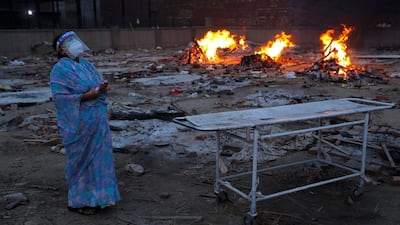Crematoriums in India are using cow-dung cakes and crop residue to perform the last rites for thousands of Covid-19 victims as the scale of the rising death toll causes a severe shortage of firewood.
More than 60,000 people have died since late March in the Hindu-majority nation of 1.3 billion, as a surge of coronavirus infections overwhelmed hospitals and crematoriums.
"The situation is so dire in the city that the [number of] cremations that would take place in a week are occurring on a single day now," Nirmal Jain, mayor of East Delhi, told The National.
India is reporting record-breaking numbers of infections and fatalities, with daily confirmed cases hitting more than 412,000 – a global record – and deaths nearing 4,000 on Thursday alone. A total of 230,000 Covid-related deaths have been registered by the government since the pandemic began.
Health experts and crematorium managers, however, say the actual cases and fatalities could be 10 times those of official figures, given the limited access to testing.
Many crematoriums are operating round the clock and some were extended into car parks, public parks and on to pavements when they ran out of space.
This includes those in the capital, New Delhi, one of the regions worst hit by the surge.
The situation was equally grim at Muslim graveyards. Delhi’s largest Muslim cemetery closed this week after running out of space.
New Delhi alone officially reported more than 5,000 deaths in April.
The surge in fatalities caused a shortage of firewood, forcing authorities to look for alternative fuels to help families perform the last rites for pandemic victims.
Two civic bodies in the city of 20 million said on Tuesday they were installing machines at government cowsheds to produce dung and crop-stubble cakes for use as fuel.
“To not put pressure on wood, we have suggested the use of cow-dung cakes and some crematoriums are using cow-dung cakes for the funerals,” Mr Jain said.
Nearly 80 per cent of India’s population are Hindu, and most of them perform cremations as last rites, as do several of India’s religious minorities including Sikhs, Buddhists and Jains.
As per Hindu tradition, each cremation requires 1,500 kilograms of firewood and other essentials, usually provided by the crematoriums.
The shortage of wood is fuelling a black market and price increases as families search for hours to collect enough logs.
Some families were forced to shell out 10 times the usual cost of firewood as demand increased.

Cities including Surat in western Gujarat state turned to mass pyres to cremate dozens of bodies at a time to deal with the shortage of wood and space. Authorities there are now using sugarcane bagasse to fuel funeral pyres. The dried sugar cane pulp is stuffed between the logs before they are set alight.
Surat hit the international news after the metal parts of crematorium furnaces melted in the heat of constant fires and the city was forced to reopen several defunct crematoriums to handle demand.
In the Hindu holy city of Varanasi, known for endless cremation spots on the banks of the River Ganges, the price of pyre wood soared from 400 rupees ($5.43) for about 100kg to 4,000 rupees ($54.30).
In Garhmukteshwar in Uttar Pradesh, another major site for Hindu cremations on the banks of the Ganges, the firewood demand made distributors double their prices, but sellers say they are reluctant to pass that on to grieving customers.
“Earlier we bought wood for 400 rupees per quintal [100kg]. Now we are buying it for 650 rupees from the suppliers but we can’t sell it for a higher price to the families. We don’t want to trouble them at a time like this,” Mahesh Kumar said.

